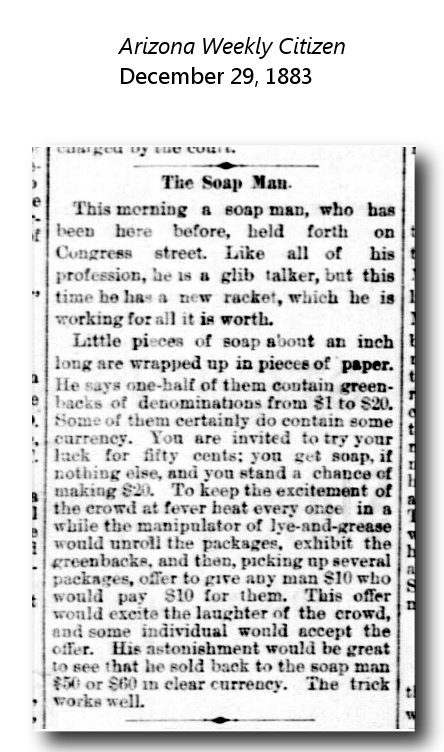ODAY IN SOAPY SMITH HISTORY: December 26th
December 26, 1883 Soapy Smith purchases a street vendors license in Phoenix, Arizona to hawk his prize package soap to the unwary.
In my collection is a xerox copy of the receipt (photo at top) from the city of Phoenix, Arizona allowing Soapy to work as a soap selling vendor for the period of one month beginning December 26, 1883 and ending January 27, 1884 for the sum of $4.00. The document is signed by Mayor De Forest Porter, Recorder Knapp and Marshal Henry Garfia.
The information and the receipt showing that Soapy was in Phoenix is not new. The newspaper clipping below, is.
So why didn't I find this before?
When doing research for the book Alias Soapy Smith the amount of newspapers online, along with the quality of the search capabilities were poor. Over the years more newspapers have been added and the search editors have greatly improved. What will never change is the content of the newspaper themselves. In looking at the article below you will notice that "Soapy" or "Jeff Smith" are absent. this means getting creative. I type in words that such articles might include, such as "soap." While this is a good key word, it also means searching through a ton of soap ads, etc. It's time consuming and most of the time I come up empty handed, but not today. I hit the jackpot.
The following clipping from Tucson, Arizona was published just three-days into the one month time span of the license. This article is also one of the very few in which the reporter did not publish that the prize package soap sell was a swindle. Did this reporter not realize it was a scam, or was he/she paid off to stay quiet. From what I can tell, Soapy was not arrested during this trip to Phoenix. However, the article does make mention that this is not Soapy's first trip to the city.
 |
| The Soap Man. |
Transcription of the clipping:
Arizona Weekly Citizen
(Tucson, Arizona)
December 29, 1883
The Soap Man.
This morning a soap man, who has been here before, held forth on Congress Street. Like all of his profession, he is a glib talker, but this time he has a new racket, which he is working for all it is worth.
Little pieces of soap about an inch long are wrapped up in pieces of paper. He says one-half of them contain greenbacks denominations from $1 to $20. Some of them certainly do contain some currency. You are invited to try your luck for fifty cents; you get soap, if nothing else, and you stand a chance of making $20. To keep the excitement of the crowd at fever heat every once in a while the manipulator of lye-and-grease would unroll the packages, exhibit the greenbacks, and then, picking up several packages, offer to give any man $10 who would pay $10 for them. This offer would excite the laughter of the crowd, and some individual would accept the offer. His astonishment would be great to see that he sold back to the soap man $50 or $60 in clear currency. The trick works well.

Soapy in Phoenix
Phoenix: pages 40-41.
"I was at Circle City when a Skaguay newspaper brought the news…. Though we were almost one thousand miles from the scene of the tragedy, the news came like an electric shock. The single copy of the newspaper was carried off to a big gambling hall, and everybody in town was packed into the place listening eagerly while the story was read aloud. A deep sigh of relief went up when the audience learned that 'Soapy' had 'cashed in.'"
—Harry Suydam
Alias Soapy Smith, p. 583.
DECEMBER 26
1620: The Mayflower, with 102 passengers, arrives at New Plymouth, Massachusetts to create the Plymouth Colony, with John Carver as Governor.
1776: The British suffer a major defeat against the Colonial Army in the Battle of Trenton during the American Revolution.
1859: 173 Texas Rangers and 165 U.S. regulars attack the outlaw position held by Juan Cortina in Rio Grande City. Hand-to-hand combat forces Cortina's retreat.
1861: Confederate irregulars defeat pro-Union Indians at Chustenahlah, Indian Territory.
1862: 38 Dakota Indians are hung in Mankato, Minnesota for their part in an uprising. The mass execution is the largest in U.S. history.
1863: A Denver brothel, the Highland “Aunt Betsy’s” House, is burnt down by a mob of soldiers. Bill Duffield, a soldier is shot and killed by Joseph Kittery when told they could not enter. The following day a mob of soldiers obtained the deceased from inside and then burnt down the brothel.
1865: The coffee percolator is patented by James H. Mason.
1866: Lieutenant Colonel George Crook leads a company of the 1st Cavalry against Indians at Owyhee Creek, Idaho Territory, killing 30 and taking 7 prisoners while losing only one soldier.
1867: A detachment of Company K, 9th Cavalry, near Ft Lancaster, Texas, is attacked by Indians. Three soldiers are killed during the two days of fighting.
1869: Lieutenant Howard B. Cushing with Company F, 3rd Cavalry, from Ft Stanton, New Mexico, along with 28 citizen volunteers, attack a Mescalero Apache Indian village at the old stage stop of Pine Spring in the Guadalupe Mountains of Texas. One officer is severely wounded.
1874: The first commercial buffalo hunt is conducted in Texas by Joe McComb.
1880: Lincoln County Sheriff Pat Garret deposits his prisoners, including Billy the Kid, in the Las Vegas, New Mexico, Territory jail.
1883: Soapy Smith purchases a street vendors license in Phoenix, Arizona for selling his prize package soap.
1909: Western artist Frederic Remington dies at age 48 in Connecticut.







No comments:
Post a Comment
Thank you for leaving your comment and/or question on my blog. I always read, and will answer all questions asap. Please know that they are greatly appreciated. -Jeff Smith